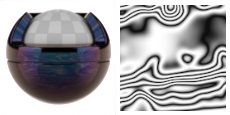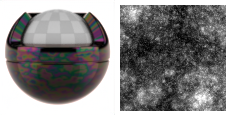The Iridescence group contains
parameters for thin films.
Thin Film
| Name |
Thin
Film |
| Type |
Decimal |
| Range |
[0..1] |
| Usage |
Uniform Value or
Grayscale
Texture |
| Description |
Thin Film interference is an
optical phenomenon where a material's surface changes color when
viewed or illuminated from different angles. The effect is
responsible for the vibrant colors observed in soap bubbles or oil
slicks. The effect is most plausible when
using texture with the Thin
Film or Thin Film
Thickness
parameters.
|
| Examples |
 |
| Example with
Texture |
 |
Thin Film Thickness
| Name |
Thin
Film Thickness |
| Type |
Decimal |
| Range |
[0..1] |
| Usage |
Uniform Value or
Grayscale
Texture |
| Description |
Thin Film Thickness defines the
thickness of the Thin Film
layer in microns. The effect is most plausible
when using texture with the Thin
Film or Thin Film
Thickness
parameters.
|
| Examples |
 |
| Example with
Texture |
 |
Thin Film
IOR (Index of
Refraction)
| Name |
Thin
Film IOR |
| Type |
Decimal |
| Range |
[1..2.5] |
| Usage |
Uniform Value |
| Description |
Thin
Film IOR defines the index of refraction of the
Thin Film layer. Different values result
in visibly different colors of refracted light from the
Thin Film substrate. The effect is most
plausible when texturing the Thin Film or
Thin Film Thickness
parameters.
|
| Examples |
 |